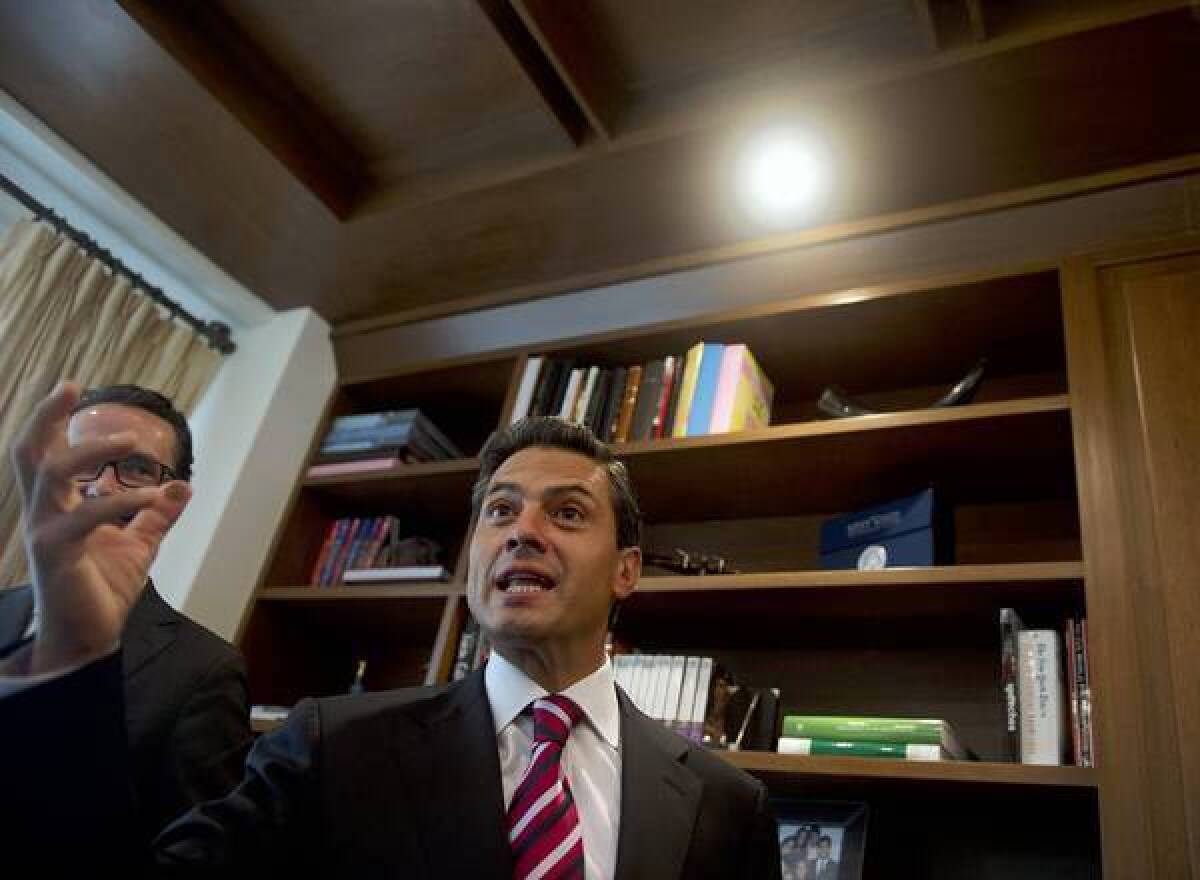Mexico President-elect Peña Nieto’s win is weaker than expected

MEXICO CITY — Mexico’s Institutional Revolutionary Party is marching back into the presidential palace bolstered by its control of a raft of state governorships and a good standing in Congress.
But its mandate is much shakier than the party had predicted before Sunday’s election, reflecting the nagging suspicions with which many Mexicans regard the PRI and complicating President-elect Enrique Peña Nieto’s ability to execute an ambitious reform program.
He will have to negotiate with rival parties, including a newly empowered left, and will not have the free hand he might have expected as he pursues initiatives such as opening up the massive state oil company, Pemex, to foreign investment. Resistance from the opposition, as well as the old guard of his party and the unions that backed him, could block reforms and condemn Mexico to status quo and economic malaise.
“His mandate is clearly weaker than expected,” said Carlos Ramirez, a Mexico analyst for the New York-based Eurasia Group.
“He will be in a tough spot. The view inside the party was that they were going to win by a landslide.... Peña will have to choose his battles because he’s likely to encounter resistance from within his coalition.”
Peña Nieto will be handcuffed to some degree by the wariness with which voters viewed handing power back to his party, whose 70-year rule was characterized by rampant corruption and authoritarian practices. Despite his victory, 3 in 5 voters cast ballots for other parties.
“It would be in the PRI’s interest to read this victory with humility, that they won despite their limitations,” said Jesus Silva-Herzog Marquez, a columnist with the newspaper Reforma. “The PRI is obliged now to show it can govern democratically. It must admit that the sources of this deep, stubborn lack of confidence are, in the end, healthy and necessary.”
Peña Nieto, who does not take office until December, appears to understand the pressure he is under to prove that the PRI has changed. Claiming victory shortly before midnight Sunday, and repeating it Monday in a meeting with reporters, he declared his future government “willing to listen, open to criticism.” What he will not do, he said, is “return to the past.”
In the Monday remarks, Peña Nieto also said he had received congratulatory messages from various heads of state, including a telephone call from President Obama. The White House said the president “reiterated his commitment to working in partnership with Mexico and looks forward to advancing common goals, including promoting democracy, economic prosperity and security in the region and around the globe, in the coming years.”
Peña Nieto repeated his plans to reform Pemex, a potential political minefield. Nationalized in the 1930s, the oil giant occupies a special place in the Mexican psyche, but needs expensive investments to maintain the production that is a principal source of state revenue.
Some Mexicans regard adding foreign capital as an affront to national pride, and the oil company’s powerful unions also will object to any loss of jobs or control.
Peña Nieto also repeated his pledge to work to reduce the violence sweeping the country while continuing the fight against drug cartels. His proposed policies do not differ radically from those of the current president, Felipe Calderon.
“There will be no truce, no pact,” Peña Nieto said of the fight against drug cartels, alluding to suggestions that the PRI of the past made deals with traffickers in exchange for peace.
According to a nearly complete vote count, Peña Nieto won 38% of the vote, more than 6 percentage points ahead of his nearest rival, leftist candidate Andres Manuel Lopez Obrador. Even as voting booths were closing, PRI officials had predicted a double-digit margin, a forecast that many opinion polls bolstered.
The PRI did chalk up a couple of additional governorships, which is important for major reforms that require constitutional changes because states have to sign off on them. The legislative picture is less clear.
The complex machinery for dividing up the upper and lower houses of Congress was just getting started. It appeared that the PRI will have the most seats, but not the outright majority it had craved. That means the PRI will have to negotiate any new initiatives with Lopez Obrador’s Democratic Revolution Party, which has emerged as the second political force in the nation, and Calderon’s badly trounced National Action Party.
Peña Nieto’s mandate is also undermined by his opponent’s refusal to accept defeat. Lopez Obrador, who finished in a stronger second place than expected, has said he will wait for final results and a legal review before conceding. In the 2006 presidential election, Lopez Obrador lost by less than a percentage point, and his refusal then to recognize the results unleashed a series of protests that paralyzed Mexico City.
On Monday, Lopez Obrador again stood firm, alleging that PRI supporters were guilty of massive fraud and vote-buying. Regardless, the left picked up two state governorships, will gain in Congress and appears newly energized.
Although not the margin it predicted, the PRI did appear to have won by a healthy enough difference to give it the kind of democratic legitimacy that PRI presidents in the days of rigged elections did not always enjoy, and more of a mandate than Calderon could claim after his razor-thin defeat of Lopez Obrador.
“He arrives with plenty of political capital,” Alfonso Zarate, a Mexico City political analyst, said of Peña Nieto. But “he has to consider that there are two significant opposition forces. The ballot boxes are saying that you won by a generous margin but there is an important group: Mexicans who voted for the other choices. You can’t ignore those choices.”
More to Read
Sign up for Essential California
The most important California stories and recommendations in your inbox every morning.
You may occasionally receive promotional content from the Los Angeles Times.











